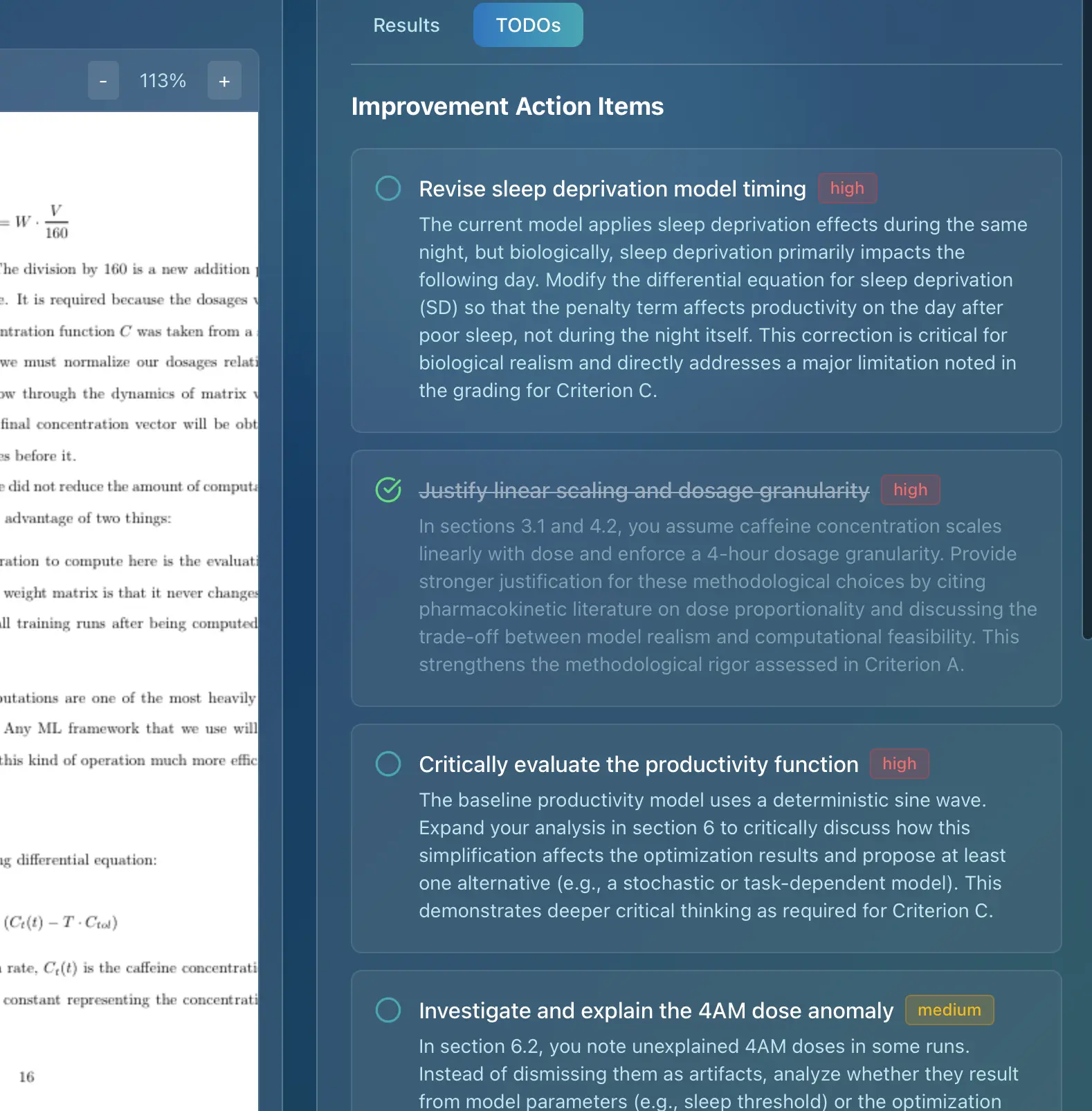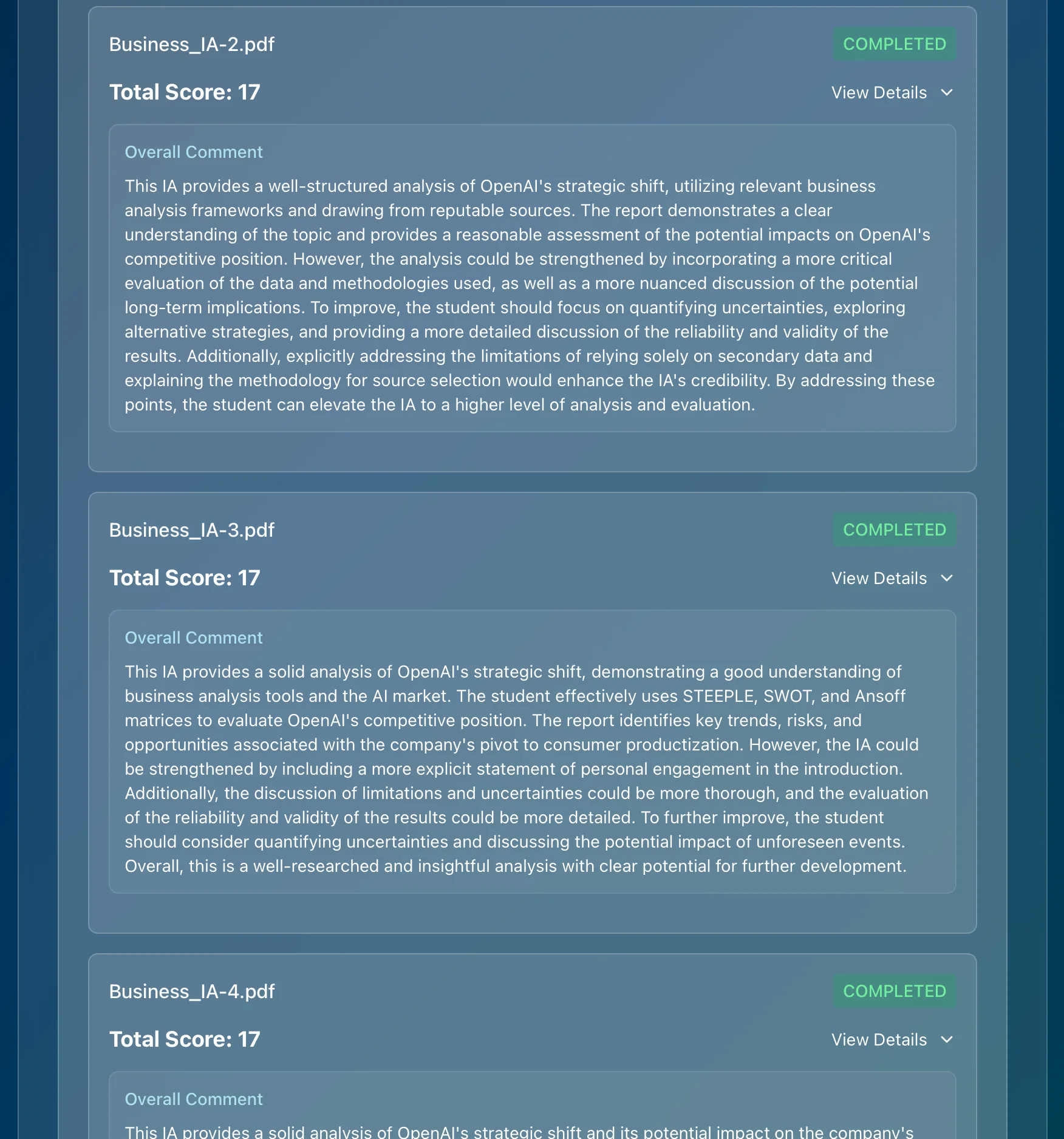Choosing a Winning Topic for Your IB Biology IA
Choosing the right topic for your IB Biology Internal Assessment (IA) is the first, and arguably one of the most crucial, steps towards achieving a high score. The IA is a significant component of your final IB Biology grade, and selecting a topic that is both interesting and manageable is key to success. This guide will provide you with a comprehensive overview of how to choose a winning topic, covering everything from brainstorming ideas to avoiding common pitfalls. We'll explore the criteria the IB uses to assess your IA, offer practical tips, and even discuss how AI-powered tools can help you refine your research and improve your final grade. Let's dive in and set you on the path to IA success!
Why Your IB Biology IA Topic Matters
Your IB Biology IA topic isn't just a subject; it's the foundation upon which your entire investigation is built. A well-chosen topic will not only make the research process more enjoyable but also significantly impact your ability to meet the assessment criteria and achieve a high score. A good topic should be:
- Relevant: Aligned with the IB Biology syllabus.
- Manageable: Feasible within the time and resource constraints.
- Interesting: Something that genuinely sparks your curiosity.
- Original (to some extent): Demonstrates your own thinking and approach.
- Testable: Allows for data collection and analysis.
Struggling with IB Assessments?
Get instant, detailed feedback on your work with AI that understands IB criteria.

Brainstorming IB Biology IA Topic Ideas
Coming up with a good topic can feel daunting, but it doesn't have to be! Here's a structured approach to brainstorming:
1. Reflect on Your Interests
What areas of biology genuinely excite you? Think about topics covered in class that you found particularly engaging. Did you enjoy learning about enzymes, genetics, ecology, or human physiology? Starting with your interests will make the research process more enjoyable and motivate you to delve deeper.
2. Review the IB Biology Syllabus
Familiarize yourself with the IB Biology syllabus to identify potential areas for investigation. This will ensure that your chosen topic aligns with the curriculum and allows you to demonstrate your understanding of key concepts.
3. Explore Real-World Applications
Consider how biological principles apply to real-world problems. This can lead to interesting and relevant IA topics. For example:
- Environmental Science: Investigate the impact of pollution on plant growth or the effectiveness of different bioremediation techniques.
- Medicine: Explore the effects of different medications on enzyme activity or the impact of lifestyle factors on cardiovascular health.
- Agriculture: Investigate the effects of different fertilizers on crop yield or the impact of pesticides on insect populations.
4. Look for Inspiration in Everyday Life
Sometimes, the best IA topics are inspired by everyday observations. For example:
- Food Science: Investigate the effect of different cooking methods on vitamin C content in fruits and vegetables.
- Sports Science: Explore the effect of different hydration strategies on athletic performance.
- Personal Care: Investigate the effect of different sunscreens on UV protection.
5. Consult Scientific Literature
Reading scientific articles can spark new ideas and provide a deeper understanding of existing research. Use online databases like PubMed, Google Scholar, and JSTOR to search for relevant articles.
Examples of Strong IB Biology IA Topics
Here are some examples of strong IB Biology IA topics, categorized by area of study:
- Enzymes: The effect of pH on the activity of catalase extracted from potatoes.
- Genetics: The effect of different concentrations of antibiotics on the growth rate of E. coli.
- Ecology: The effect of light intensity on the rate of photosynthesis in Elodea (pondweed).
- Human Physiology: The effect of exercise intensity on heart rate and blood pressure.
- Plant Biology: The effect of different types of soil on the growth rate of bean plants.
Remember: These are just examples. Your IA topic should be unique and reflect your own interests and research questions.
Refining Your Research Question
Once you have a general topic idea, you need to refine it into a specific, testable research question. A good research question should be:
- Focused: Clearly define the variables you are investigating.
- Measurable: Allow for quantitative data collection.
- Achievable: Feasible within the time and resource constraints.
- Relevant: Aligned with the IB Biology syllabus and your interests.
Example:
- Too broad: "How does exercise affect the body?"
- Better: "What is the effect of increasing exercise intensity (measured by heart rate) on systolic blood pressure in healthy adults aged 18-25?"
The Importance of a Strong Hypothesis
Your hypothesis is a testable prediction about the relationship between your independent and dependent variables. It should be based on your understanding of the underlying biological principles and supported by existing scientific literature.
Example:
- Research Question: "What is the effect of different concentrations of salt (NaCl) on the germination rate of radish seeds?"
- Hypothesis: "Increasing the concentration of salt (NaCl) will decrease the germination rate of radish seeds due to osmotic stress."
Designing Your Experiment
A well-designed experiment is crucial for collecting reliable data and drawing valid conclusions. Consider the following factors:
- Independent Variable: The variable you are manipulating (e.g., salt concentration).
- Dependent Variable: The variable you are measuring (e.g., germination rate).
- Control Variables: Variables that you keep constant to ensure that only the independent variable is affecting the dependent variable (e.g., temperature, light, humidity).
- Sample Size: The number of replicates you use for each treatment group. A larger sample size will increase the statistical power of your experiment.
- Control Group: A group that does not receive the treatment (e.g., radish seeds germinated in distilled water).
Pro Tip: Get AI-Powered Grading
Stop second-guessing your grades. Get instant feedback aligned with official IB rubrics.

Common Challenges/Mistakes in Choosing an IA Topic
Many students struggle with choosing an appropriate IA topic. Here are some common mistakes to avoid:
- Choosing a topic that is too broad or too complex: This can make it difficult to collect meaningful data and draw valid conclusions.
- Choosing a topic that is not aligned with the IB Biology syllabus: This can result in a lower score on the assessment criteria.
- Choosing a topic that is not feasible within the time and resource constraints: This can lead to frustration and incomplete data.
- Failing to consider safety, ethical, and environmental considerations: This can result in a lower score and potential harm to yourself or others.
- Not properly controlling variables: This can lead to unreliable data and invalid conclusions.
Example: Trying to investigate the effects of climate change on a local ecosystem is likely too broad and complex for an IA. Instead, focus on a specific aspect, such as the effect of increased temperature on the growth rate of a particular plant species.
Advanced Tips/Strategies for a High-Scoring IA
To take your IA to the next level, consider these advanced tips:
- Focus on a novel aspect: While you don't need to discover something entirely new, try to add a unique twist to your investigation. This could involve investigating a different variable, using a different methodology, or applying your research to a new context.
- Conduct a thorough literature review: This will demonstrate your understanding of the existing research and help you to refine your research question and hypothesis.
- Use statistical analysis to support your conclusions: This will add rigor to your analysis and help you to identify significant trends in your data.
- Critically evaluate your methodology and results: Discuss the limitations of your experiment and suggest improvements for future research.
- Pay attention to the IA rubric: Understand the assessment criteria and ensure that your IA meets all the requirements.
Example: Instead of simply investigating the effect of pH on enzyme activity, you could investigate the effect of pH on the activity of an enzyme extracted from a less commonly studied source, such as a local plant species.
Understanding the IB Biology IA Rubric
The IB Biology IA is assessed based on four criteria:
- Criterion A: Research Design (6 marks): This assesses the clarity of your research question, the appropriateness of your methodology, and your consideration of safety, ethical, and environmental factors. To score highly, your research question must be well-defined, your methodology clearly explained and justified, and your safety, ethical, and environmental considerations comprehensively addressed. For 5-6 marks, the methodology should be detailed enough to be reproduced.
- Criterion B: Data Analysis (6 marks): This assesses your ability to collect, process, and interpret data accurately and appropriately. To score highly, your data must be presented and processed accurately, uncertainties must be considered effectively, and the processing of data must be relevant to the research question. For 5-6 marks, communication of data recording and processing must be precise and easily understood.
- Criterion C: Conclusion (6 marks): This assesses the validity of your conclusion based on the data analysis and scientific context. To score highly, your conclusion must be relevant to the research question, fully supported by the data analysis, and compared to accepted scientific literature. For 5-6 marks, a relevant and detailed comparison to accepted scientific literature must be included with sufficient citation.
- Criterion D: Evaluation (6 marks): This assesses your ability to evaluate the strengths and weaknesses of your investigation, discuss methodological issues, and suggest improvements. To score highly, you must discuss the relevant strengths of the report and investigation, identify specific methodological weaknesses, and explain their relative impacts. For 5-6 marks, you must identify realistic and relevant improvements to the investigation and explain them.
Technology and Modern Assessment: How AI Can Help
Technology is revolutionizing the way we approach IB assessments, and AI is playing an increasingly important role. AI-powered tools can help you with various aspects of your IA, from brainstorming ideas to analyzing data and writing your report.
One of the most significant benefits of AI is its ability to provide instant, accurate, and detailed feedback on your work. Marksy, for example, is a leading AI grading assistant specifically designed for the International Baccalaureate. It uses official IB rubrics to provide rubric-aligned scoring, detailed criterion-by-criterion feedback, and suggestions for improvement. This can help you understand exactly how to improve your work and achieve a higher score.
For teachers, Marksy offers significant time-saving benefits. It automates the grading process, allowing teachers to focus on providing personalized support to their students. The AI ensures consistent and fair assessment, as it adheres strictly to the IB criteria. This helps maintain assessment quality while freeing up valuable time for educators.
AI tools like Marksy use sophisticated algorithms to analyze your work and identify areas for improvement. They can help you:
- Refine your research question: By analyzing the existing literature and identifying gaps in knowledge.
- Design your experiment: By suggesting appropriate methodologies and controls.
- Analyze your data: By performing statistical analysis and identifying significant trends.
- Write your report: By providing feedback on your writing style, grammar, and organization.
- Ensure rubric alignment: By comparing your work to the official IB criteria and identifying areas where you need to improve.
Conclusion: Your Path to IA Success
Choosing a winning topic for your IB Biology IA is a critical step towards achieving a high score. By following the tips and strategies outlined in this guide, you can select a topic that is both interesting and manageable, design a well-controlled experiment, collect reliable data, and draw valid conclusions. Remember to pay close attention to the IB Biology IA rubric and seek feedback from your teacher throughout the process.
And don't forget to leverage the power of technology! Tools like Marksy can provide invaluable support and help you to maximize your potential.
Ready to take your IB Biology IA to the next level? Try Marksy for free today and experience the power of AI-driven feedback! Sign up now and unlock your full potential!